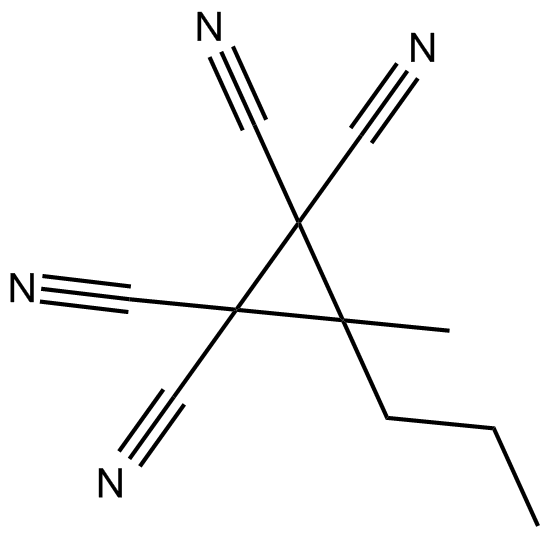CCG 2046 |
| Catalog No.GC16137 |
CCG 2046 is a RGS4 inhibitor with an IC50 of 4.3 μM against RGS4-Gαo interaction signal.
Products are for research use only. Not for human use. We do not sell to patients.

Cas No.: 13017-69-1
Sample solution is provided at 25 µL, 10mM.
CCG 2046 is an inhibitor of TNF-α with IC50 values of 2.32 µM and 0.66 µM in the HTRF assay and the ELISA assay, respectively [1]. CCG 2046 is also an inhibitor of RGS4.
Three members of tumor necrosis factor (TNF) family are: TNF-α, TNF-β (also called lymphotoxin α, LT-α) and LT-β. Tumor necrosis factor-α (TNF-α) is a secreted cytokine. It plays an important role in immune disorders and inflammatory diseases. TNF-α is also involved in the inhibition of viral replication and in some cases of programmed cell death. At the cellular level, TNF-α can regulate multiple signaling pathways, such as NF-kB activation and apoptosis [1].
Both LPS and TNF-α can downregulate RGS4 [2]. CCG 2046 reduced the RGS4-Gα0 interaction signal with an IC50 value of 4.3 ± 0.2 µM [3]. Infliximab is also a TNF-α inhibitor [4]. IL-10 mRNA was upregulated by 2.6 folds after stimulating mTNF using rabbit antihuman TNF-α polyclonal Ab for 6 hours. WT mTNF-transfected Jurkat cells incubated with infliximab at 10 µg/mL for 24 hours also showed a 2.7-fold increase in the production of IL-10 with statistical significance. These results were indicated by cDNA expression array analysis [5].
Infliximab is described hereafter. 1 h after the infusion with infliximab, concentrations of serum TNF-α protein in a subset of patients were significantly reduced. At 24 and 48 h following the first dose of infliximab, patients showed a significantly declined CCL2 concentration [4]. TNF-α was suggested to promote the expression of CCL2 by tumor cells [6].
References:
[1]. Leister KP, Huang R, Goodwin BL, et al. Two high throughput screen assays for measurement of TNF-α in THP-1 cells. Current chemical genomics, 2011, 5(1): 21-29.
[2]. Magder S, Neculcea J, Neculcea V, et al. Lipopolysaccharide and TNF-α produce very similar changes in gene expression in human endothelial cells. Journal of vascular research, 2006, 43(5): 447-461.
[3]. Roman DL, Talbot JN, Roof RA, et al. Identification of small-molecule inhibitors of RGS4 using a high-throughput flow cytometry protein interaction assay. Molecular pharmacology, 2007, 71(1): 169-175.
[4]. Brown ER, Charles KA, Hoare SA, et al. A clinical study assessing the tolerability and biological effects of infliximab, a TNF-α inhibitor, in patients with advanced cancer. Annals of oncology, 2008, 19(7): 1340-1346.
[5]. Mitoma H, Horiuchi T, Hatta N, et al. Infliximab induces potent anti-inflammatory responses by outside-to-inside signals through transmembrane TNF-α. Gastroenterology, 2005, 128(2): 376-392.
[6]. Ben-Baruch A. Inflammatory cells, cytokines and chemokines in breast cancer progression: reciprocal tumor-microenvironment interactions. Breast Cancer Research, 2003, 5(1): 31-36.
Average Rating: 5 (Based on Reviews and 33 reference(s) in Google Scholar.)
GLPBIO products are for RESEARCH USE ONLY. Please make sure your review or question is research based.
Required fields are marked with *




















